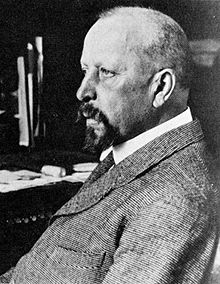Leland Ossian Howard
Leland Ossian Howard (born June 11, 1857 in Rockford , Illinois , † May 1, 1950 ) was an American entomologist and parasitologist .
Life
Howard studied primarily zoology at Cornell University , graduating with a bachelor's degree in 1877 and a master's degree in botany four years later . From 1878 he worked in the Department of Agriculture in Washington, DC as an entomologist, initially as an assistant to Charles Valentine Riley . In 1894 he became chief entomologist there and thus head of the latter's Bureau of Entomology (the bureau was only established in 1904 after a considerable increase in financial resources, thanks mainly to Howard). He remained its director for 30 years until 1927 and during this time he had a great influence on entomological research in the USA, especially on insect control. He also taught entomology at various colleges and universities. In 1931 he officially retired.
After completing his pre-medical training at Cornell, he studied medicine in evening classes at George Washington University , where he earned his MD . He dealt with many questions of applied entomology, especially in agriculture and medicine (mosquitoes, house flies as disease carriers). For example, he researched hymenoptera parasitic species and pioneered the use of insect parasites in agriculture. He became known through his translated into many languages book The threat of insects (The Insect Menace). He never tired of describing the dangers posed by insects and the possibilities of combating them in popular scientific publications.
Howard described 47 new species of insects and 294 new species of insects , including 22 species of mosquitoes.
He was a member of the National Academy of Sciences , the American Academy of Arts and Sciences , the American Philosophical Society and permanent secretary of the American Association for the Advancement of Science , of which he was president in 1920. From 1894 to 1907 he was secretary of the Cosmos Club and in 1909 its president. He was Honorary Curator of the US National Museum ( Smithsonian Institution , Washington DC) and from 1904 advisor to the Public Health Service on insect issues.
He was one of the founders of the Entomological Society of Washington in 1884 and editor of Insect Life magazine.
Howard was a knight and officer in the Legion of Honor . He has received five honorary doctorates, including from Georgetown University and George Washington University. In 1931 he received the Capper Award and he received the Buffon Medal of the French Natural History Museum. He traveled a lot, made numerous international contacts and was an honorary member of many foreign entomological societies.
Fonts
He published almost 1,000 articles.
- Mosquitoes. How they live, how they carry disease, how they are classified and how they may be destroyed , McClure, Phillips & Co., 1901
- The Insect Book , Doubleday, Page & Company, 1901
- The House Fly-Disease Carrier: an account of its dangerous activities and of the means of destroying it , Frederick A. Stokes Company, 1911
- with Harrison Gray Dyar, Frederick Knab Mosquitoes of North and Central America and the West Indies , Carnegie Institution of Washington, 1917
- The Insect Menace , New York, London, Century Co. 1931
- Fighting the insects: the story of an entomologist , MacMillan, 1933
Web links
- John E. Graf, Dorothy W. Graf: Biographical Memoirs National Academy, pdf
Individual evidence
- ^ Member History: Leland O. Howard. American Philosophical Society, accessed October 4, 2018 .
- ^ Wigglesworth life of insects , Rencontre 1971 edition, Howard entry
| personal data | |
|---|---|
| SURNAME | Howard, Leland Ossian |
| BRIEF DESCRIPTION | American entomologist |
| DATE OF BIRTH | June 11, 1857 |
| PLACE OF BIRTH | Rockford , Illinois |
| DATE OF DEATH | May 1, 1950 |
